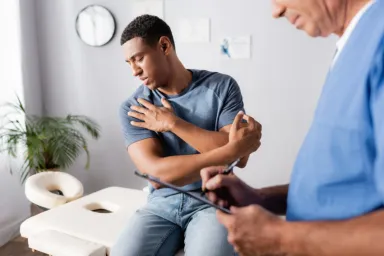Feeling more tired, weaker, or less motivated as the years go by? Aging doesn’t have to mean losing your edge. Entering your mid-30s and beyond often means noticing slower recovery, less energy, or fading drive. These changes may reflect age-related declines in testosterone rather than just aging. In fact, testosterone replacement therapy (TRT)1 in hypogonadal men over 35 has demonstrated measurable improvements in strength, mood, sexual health, bone health, and metabolic balance in middle-aged men.
You’ve worked hard to build your success, now it’s time to feel as strong and driven as you are. At Vita Bella, our expert-guided TRT treatments help men over 35 regain energy, sharpen focus, and boost overall wellness. Start your transformation today and rediscover the best version of yourself.
Why TRT Matters after Age 35?
After about age 30, testosterone declines gradually (≈1% per year). As a result, many men over 35 develop late-onset hypogonadism, characterized by low or low-normal testosterone plus symptoms (fatigue, low libido, muscle decline).
Because many symptoms mimic aging, men often delay diagnosis until significant dysfunction occurs. TRT offers a way to restore hormone levels closer to youthful ranges, thereby reversing multiple aspects of decline.
What are the Clinical Benefits of TRT in Men Over 35?
TRT provides measurable improvements in energy, mood, and sexual health for men over 35 experiencing low testosterone. It enhances muscle mass, reduces body fat, and supports bone strength, helping men feel stronger, more focused, and revitalized in both mind and body.
1- Improved Sexual Function and Libido
Meta-analyses 2 show TRT significantly improves libido, erectile function, and sexual satisfaction compared with placebo in hypogonadal men. In a symptom-subgroup meta-analysis, men with baseline sexual dysfunction were more likely to derive benefit from testosterone treatment versus placebo. Thus, beyond restoring hormone levels, TRT often reactivates sexual desire and performance.
2- Lean Mass, Strength and Body Composition
TRT boosts lean body mass (muscle) and tends to reduce fat accumulation. A systematic review 3 of musculoskeletal outcomes concluded that testosterone is osteogenic, myogenic, and catabolic to fat in hypogonadal men. A review 4 suggested that in older and middle-aged men, combining TRT with resistance exercise yields even better lean mass gains, particularly in limbs, than either alone.
Some RCTs 5 in frail older men showed improved muscle strength after six months of testosterone therapy. These changes translate into better mobility, less sarcopenia, and more resilience in daily tasks.
3- Mood, Energy and Quality of Life
In men aged 40+ with low testosterone, TRT delivered modest but clinically meaningful benefits in energy, mood, and overall wellness in placebo-controlled trials 1.
A broader meta-analysis of RCTs 2 confirmed that symptomatic hypogonadal men show improved mood and quality-of-life scores after TRT with acceptable safety. Frequently, men report more drive, mental clarity, reduced irritability, and a greater sense of purpose within months.
4- Bone Density, Metabolic Effects and Health Markers
TRT supports bone health by increasing bone density and strength, particularly in men with low baseline bone mineral density. Metabolically, TRT has been associated with improved insulin sensitivity, reduced central adiposity, and favorable lipid changes in some male cohorts 1.
More recent data 6 suggest that in middle-aged and older hypogonadal men, TRT does not significantly increase cardiovascular risk. In fact, updated analyses (e.g., TRAVERSE trial) show cardiovascular safety comparable to placebo, although the risk of arrhythmia may be modestly elevated. Thus, when carefully monitored, TRT offers favorable effects beyond symptom relief.
What to Expect Over Time with TRT?
With consistent TRT, most men notice improved energy, mood, and libido within the first few weeks. Over several months, muscle tone, focus, and overall strength were increased as hormone levels stabilized, leading to lasting improvements in performance and wellness.
Weeks to months: Improved libido, energy, concentration, and mood.
3 to 6 months: Measurable gains in lean mass and reduced fat, along with better recovery.
6 to 12 months and beyond: Continued improvements in bone density and metabolic health; steady gains plateau.
Keep in mind, individual response depends on baseline testosterone levels, lifestyle, exercise, nutrition, and adherence.
What are the Keys to Safe and Effective Transformation?
Achieving safe and effective results with TRT requires personalized dosing, regular medical monitoring, and a balanced lifestyle. Combining therapy with proper nutrition, exercise, and sleep ensures optimal hormone levels, maximized benefits, and long-term health stability.
Individualized dosing & delivery: Whether by injection, gel, or pellets, a customized plan reduces peaks, troughs, and side effects.
Rigorous monitoring: Check testosterone levels, hematocrit, estradiol, PSA, and lipids every 3–6 months to guide adjustments.
Combine with lifestyle: Resistance training, good sleep (7–9 hours), weight control, and optimal nutrition amplify TRT outcomes.
Long-term perspective: Be patient, some benefits emerge gradually; consistency is more critical than bursts.

Why Do Men Over 35 Benefit Most?
Men over 35 often begin with both hormonal decline and lifestyle stresses (career, family, inactivity). Tropes of “getting older” mask real, reversible hormone deficits. Because decrease is slower than in later decades, men over 35 typically respond robustly to TRT, achieving substantial improvements in sexual health, body composition, and mood over months. Moreover, preventive intervention can slow downstream risks of osteoporosis, metabolic syndrome, and further hormonal breakdown.
From Tired to Energized - Start Your Transformation Today with Vita Bella
If low energy, poor recovery, and dwindling motivation have become your new normal, you deserve more than a quick fix. With expert supervision and personalized treatment, we tailor every plan to your unique goals and lifestyle.
At Vita Bella, we use data-driven TRT to help men over 35 rebalance hormones, rebuild confidence, and reignite performance. Experience the transformation that comes from restoring your body’s natural power.
FAQs
Does testosterone replacement therapy really work for men over 35?
Yes, clinical studies consistently show that TRT helps men over 35 improve energy, libido, strength, and focus by restoring optimal hormone balance. With proper medical supervision, most men notice measurable physical and mental benefits within the first few months of treatment.
Is testosterone replacement therapy safe when monitored by a doctor?
Yes, when prescribed and managed by experienced physicians, TRT is considered safe and effective. Regular blood work and follow-ups ensure hormone levels stay balanced, minimizing risks while optimizing results for long-term muscle health and mental performance.
Can testosterone therapy help with mood, confidence, and mental clarity?
Yes, studies show that restoring healthy testosterone levels improves motivation, focus, and emotional stability. Many men report feeling calmer, more confident, and mentally sharper within weeks, as TRT positively influences brain chemistry and overall psychological wellness.
Will I need to stay on testosterone therapy forever once I start?
Not necessarily, some men benefit long-term, while others may restore natural balance through lifestyle, nutrition, and medical support. Vita Bella creates individualized treatment plans to ensure the safest, most sustainable results tailored to your unique hormone health goals.
References:
Grossmann, M., Anawalt, B. D., & Yeap, B. B. (2024). Testosterone therapy in older men: Clinical implications of recent landmark trials. European Journal of Endocrinology, 191(1), R22–R31. https://doi.org/10.1093/ejendo/lvae071
Ponce, O. J., Spencer-Bonilla, G., Alvarez-Villalobos, N., et al. (2018). The efficacy and adverse events of testosterone replacement therapy in hypogonadal men: A systematic review and meta-analysis of randomized, placebo-controlled trials. The Journal of Clinical Endocrinology & Metabolism, 103(5), 1745–1754. https://doi.org/10.1210/jc.2018-00404
Buratto, J., McLachlan, R. I., Handelsman, D. J., & Desai, R. (2024). Safety and efficacy of testosterone therapy on musculoskeletal health and clinical outcomes in men: A systematic review and meta-analysis of randomized placebo-controlled trials. The Lancet Healthy Longevity, 5(7), e444–e456. https://doi.org/10.1016/S2666-7568(24)00095-7
Green, D. J., Maiorana, A. J., O’Driscoll, G., & Dembo, L. (2024). Comparing the impacts of testosterone and exercise on lean body mass, strength and aerobic fitness in aging men. The Journal of Clinical Endocrinology & Metabolism, 109(4), 1058–1068. https://doi.org/10.1210/clinem/dgad123
Srinivas-Shankar, U., Roberts, S. A., Connolly, M. J., O’Connell, M. D. L., Adams, J. E., Oldham, J. A., & Wu, F. C. W. (2010). Effects of testosterone on muscle strength, physical function, body composition, and quality of life in intermediate-frail and frail elderly men: A randomized, double-blind, placebo-controlled study. The Journal of Clinical Endocrinology & Metabolism, 95(2), 639–650. https://doi.org/10.1210/jc.2009-1251
Jaiswal, V., Dev, D., Jamthikar, A., Ranka, S., Kesharwani, R., Kaur, H., Shukla, M., Pareek, G., & Gupta, D. (2022). Association between testosterone replacement therapy and cardiovascular outcomes: A meta-analysis of 30 randomized controlled trials. The Aging Male, 25(1), 78–88. https://doi.org/10.1080/13685538.2021.2007886





















